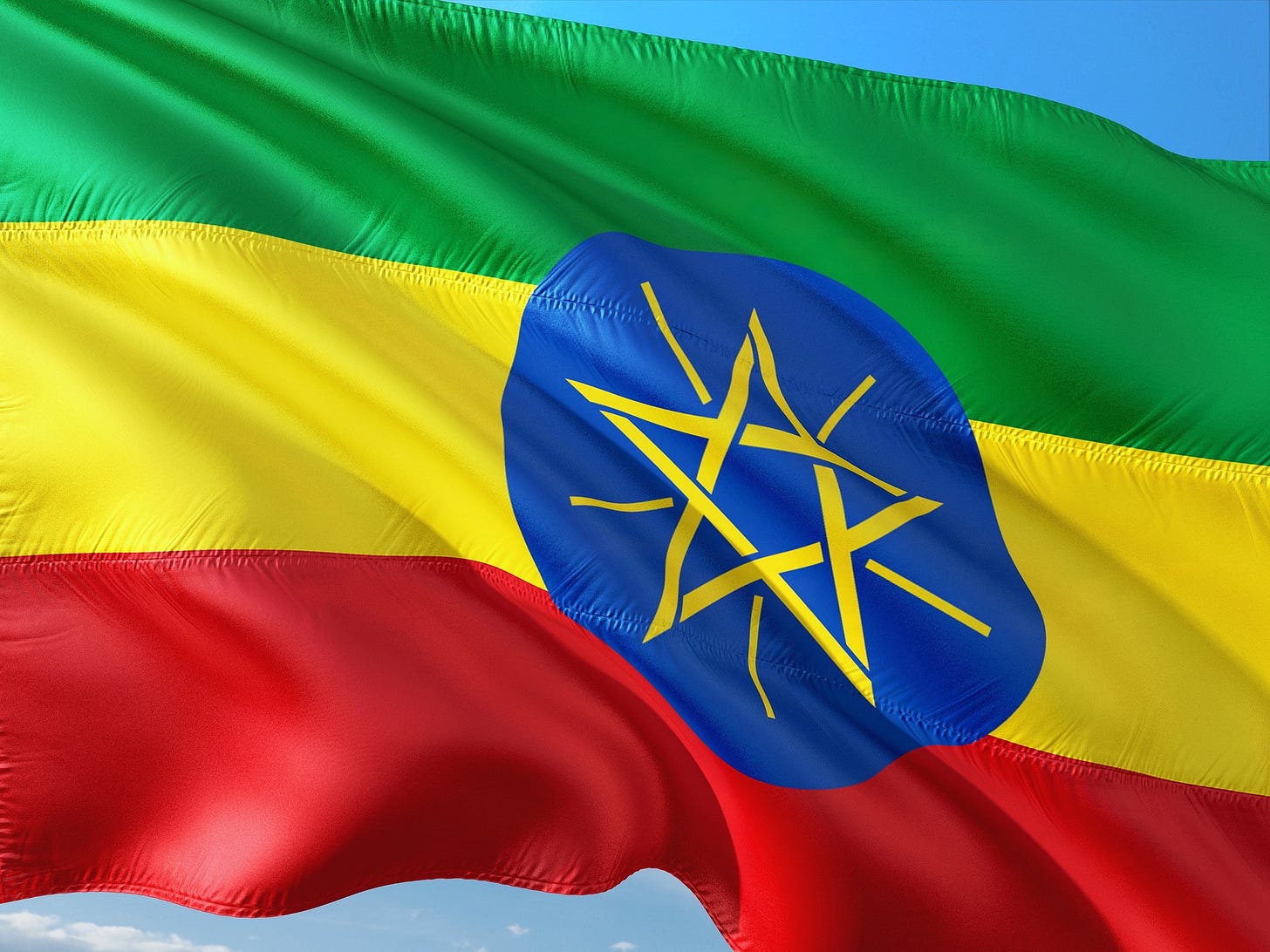A Candid Conversation About Ethiopia’s Transitional Justice Policy
Since 2020, Ethiopia’s government and forces in its northern Tigray region have been involved in deadly conflict, leaving over 600,000 people dead and approximately 4 million internally displaced persons in desperate need of humanitarian food assistance. Clashes over political control and state reform are among many factors that led to the crisis. The triggering event in the conflict can be traced back to November 2020, when the Ethiopian army attacked Tigrayan troops, who had taken control of military headquarters in the capital of the Tigray region, in northern Ethiopia. However, this attack was symptomatic of a deep-rooted power struggle between Ethiopian communities, within an ethnic-based federal system.
The Tigray People’s Liberation Front (TPLF) was the main force ruling Ethiopia for nearly three decades. The TPLF lost power in the mid-2010s, over the course of anti-government protests and a change in government administration following the appointment of Abiy Ahmed as prime minister in 2018. However, ethnic tensions, muddied with power struggles and territorial disputes, erupted under Ahemd’s government and led to a disastrous humanitarian crisis.
Investigations by the Ethiopian Human Rights Commission (EHRC), Office of the United Nations High Commissioner for Human Rights (OHCHR), and the International Commission of Human Rights Experts on Ethiopia (ICHREE) discovered that all parties to the conflict, including the Ethiopian National Defense Forces, the Tigray and Amhara forces, and Eritrean Defense Forces, have committed mass atrocities, including mass rape and other crimes against humanity.
In December 2023, the OHCHR, in tandem with the EHRC, released a report encouraging the Ethiopian government to implement multiple tracks of transitional justice. The United Nations Security Council has defined transitional justice as the full range of processes that ensure accountability, serve justice, and achieve reconciliation after a state experiences large-scale conflict, repression, and abuses. Ethiopia’s Council of Ministers approved this long-awaited policy draft in April 2024, including a temporal scope for prosecution covering crimes since 1995. If implemented correctly, the policy will be a milestone in Ethiopia’s history, including the potential to bring peace and stability to the region.
Sarah Hunter, Senior Research and Advocacy Officer and Communications Specialist at the Global Centre for the Responsibility to Protect, conducts research on populations at risk of mass atrocities, focusing on the Horn of Africa, among other regions. In an interview with Hunter, she discussed the concerns that have cast doubt on the legitimacy of Ethiopia’s transitional justice process.
Hunter made clear that one of the most pervasive concerns among the international community and civil society is the fact that the very government that committed the mass atrocities is still in power. Thus, they are the ones responsible for effectuating the transitional justice policy. She noted, “[t]he analogy that I use often is the analogy of Ukraine. Would you allow the Russian government to prosecute its own soldiers and personnel and government officials and military officials for abuses in Ukraine? The answer will always be a resounding no. So why are we putting all of our eggs, when it comes to international support, in the [Ethiopian] government’s basket?”
There was once hope that the current prime minister of Ethiopia, Abiy Ahmed, would become a “unifier” of the country “after years of fracture.” He made history in 2018 as the nation’s first leader to identify as Oromo, one of the country’s largest ethnic groups and was even awarded a Nobel Peace Prize for his efforts to resolve the border conflict with Eritrea in 2019. Hunter observed, “I think people forget that he was an intelligence officer. There’s a draw to him because he’s a very charismatic guy.” But shortly thereafter, the hope for Ahmed’s administration, coveted by the global community, turned to grave concern as ethnic and political relations intensified once again, resulting in a full-scale civil war.
One may be wondering how Ethiopia may be able to prosecute itself. If Ethiopia refuses to prosecute itself, the only other recourse may be another international or regional body.
Hunter regrettably noted that there are no other avenues. “The ICC [International Criminal Court] doesn’t have jurisdiction in either [Ethiopia or Eritrea].” There is not a regional criminal court that would have jurisdiction over prosecuting these crimes either. The last remaining option could be the implementation of universal jurisdiction, but this is not likely to bring justice to the full scope of the atrocities committed. So, while Ethiopia didn’t necessarily need to submit itself to the ICC or another regional body, at the very least, the government could have invited international observers or experts to merely provide technical advice to reflect some indications of good faith.
Unfortunately, the Ethiopian government has been extremely resistant to international involvement in the transitional justice policy implementation. Local and international surveys have revealed a limited support for international experts serving as judges and prosecutors, but this doesn’t necessarily have to preclude their inclusion at a technical level. Meanwhile, public officials are stressing the importance of national focus within the policy. Justice Minister, Gedion Timothewos, reiterated these themes of national ownership, stating that “[the Government] welcome[s] partners, we welcome more support and advice[,] not dictates. No court or commission will render justice in Ethiopia in foreign languages.”
When asked to explain why the government has pushed back so vehemently on governmental influence and if this conflict is really all about principles of state autonomy, Hunter stated “[i]t is about autonomy, but it's autonomy in a way that is detrimental to the whole process. It’s autonomy for the sake of autonomy… and it's also autonomy in the way of protecting themselves.” In addition, Hunter noted that historically, there has been a lack of an independent judiciary in Ethiopia, one that Ethiopians have not trusted or believed to have their best interest at heart. “You’re starting all of this on a foundation of mistrust and suspicion.”
If the government refuses international involvement and the citizenry generally distrusts the government to truthfully enact their policy, we are looking at an undeniable repudiation of justice. The people of Ethiopia are already feeling the implications of this. For example, the Ethiopian government organized consultations with survivors of the war and presented these testimonies to U.N. bodies, but none of the victims’ recommendations were included in the final draft of the policy. Specifically, issues of gender sensitivity, crimes that were repeatedly addressed by survivors, civil society, and U.N. bodies, have been almost completely neglected by the Ethiopian government.
“You’re talking about rape as a widespread systematic act in the conflict… It is such a widespread concern, especially for women in Tigray. How do you move forward when that central crime that was committed against so many people goes unaddressed?” Hunter asked.
At the same time, Ahmed has gradually altered the makeup of his administration. Hunter commented that initially, Ahmed’s government did a good job with gender representation, but since then, has been systematically removing most of the women from their high-level positions. In early October, the first female president of Ethiopia, Sahle-Work Zewde, symbolically stepped down, admitting rumors of disagreements between her and Ahmed’s vision of government.
There are major concerns that have cast doubt on Ethiopia’s historical, yet shaky, transitional justice policy. With that being said, the international community remains involved in monitoring Ethiopia’s transitional justice process via the advocacy of international and local civil society organizations (CSOs). All considered it is vital for the public to keep their eyes on Ethiopia as they embark on this remarkably important next step for their country.
Written by Hannah Knight, 2024-2025 PCFR Fellow.
The views expressed are solely those of the writer and not those of PCFR, which takes no institutional position on policy.
This is part of a series of articles written by PCFR fellows.







